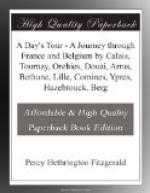[Illustration: BERGUES.]
It seemed a city of the dead. Now rang out the husky tinkling of the chimes which never flag, as in all Flemish cities, day or night. It supplies the lack of company, and has a comforting effect for the solitary man. From afar off comes occasionally the sound of the drum or the bugle, fit accompaniment for such surroundings. At the foot of the belfry was an antique building in another style, with a small open colonnade, which, though out of harmony, was still not inappropriate. The only thing jarring was a pretentious modern town-hall, in the style of one of our own vestry buildings, ’erected out of the rates,’ and which must have cost a huge sum. It was of a genteel Italian aspect, so it is plain that French local administrators are, in matters of taste, pretty much as such folk are with us. One could have lingered long here, looking at this charming and graceful work, which its surroundings became quite as much as it did its surroundings.
While thus engaged it was curious to find that not a soul crossed the place. Indeed, during my whole sojourn in the town, a period of about half an hour, I did not see above a dozen people. There were but few shops; yet all was bright, sound, in good condition. There was no sign of decay or decaying; but all seemed to sleep. It was a French ‘dead city.’ But it surely lives and will live, by its remarkable bell tower, which at this moment is chiming away, with a melodious huskiness, its gay tunes, repeated every quarter of an hour, while as the hour comes round there breaks out a general and clamorous charivari.
XI.
ST. OMER.
After leaving this wonderful place, I was now speeding on once more back into France. In all these shifts and changes the douanier farce was carefully gone through. I was regularly invited to descend, even though baggageless, and to pass through the searching-room, making heroic protest as I did so that ‘I had nothing to declare.’ It was easy to distinguish the two nations in their fashion of performing this function, the French taking it au serieux, and going through it histrionically, as it were; the Belgian being more careless and good-natured. There lingers still the habit of ‘leading’ or plombe-ing a clumsy, troublesome relic of old times. Such small articles as hat-cases, hand-bags, etc., are subjected to it; an officer devoted to the duty comes with a huge pair of ‘pincers’ with some neat little leaden discs, which he squeezes on the strings which have tied up the article.
Now we fly past the flourishing Poperinghe—a bustling, thriving place, out of which lift themselves with sad solemnity a few tall iron-gray churches, and another—yet one more—elegant belfry. There seems something quaint in the name of Poperinghe, though it is hardly so grotesque as that of another town I passed by, ‘Bully Greny.’




